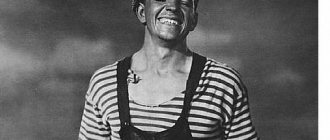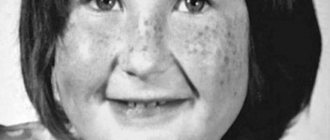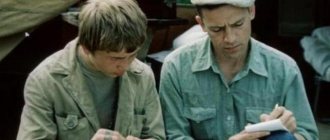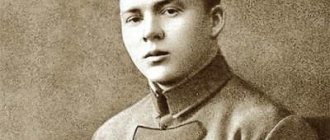Biography of Lavrenty Beria
Lavrentiy Pavlovich Beria is one of the most influential politicians of the Stalinist period, the all-powerful chief of the NKVD, whose name is associated with both the executions of representatives of the party and military elite, mass repressions, and important achievements in the field of increasing the economic potential of the country, reorganizing foreign intelligence activities, creating a domestic nuclear weapons.
In the photo: Lavrenty Pavlovich Beria
By the time of Joseph Stalin’s death, he headed the Ministry of Internal Affairs (which included the MGB), taking control of the entire political and economic life of the country, and was one of the most likely contenders for the position of “Leader of the Peoples” along with Malenkov and Khrushchev).
Management of the country's military industry
Since December 1944, Beria has been a member of the Supervisory Council for the creation of the first atomic bomb in the USSR. To implement this project, great working and scientific potential was required. This is how the State Administration of Camps (GULAG) system was formed. A talented team of nuclear physicists was assembled. The Gulag system provided tens of thousands of workers for uranium mining and the construction of testing equipment (in Semipalatinsk, Vaigach, Novaya Zemlya, etc.). The NKVD provided the necessary level of security and secrecy for the project. The first tests of atomic weapons were carried out in the Semipalatinsk region in 1949.
In July 1945, Lavrenty Beria (photo on the left) was promoted to the high military rank of Marshal of the Soviet Union. Although he never took part in direct military command, his role in organizing military production was a significant contribution to the final victory of the Soviet people in the Great Patriotic War. This fact of Lavrenty Pavlovich Beria’s personal biography is beyond doubt.
Childhood and adolescence
The future high-ranking security official was born on March 29, 1899 into a family of peasants living in the mountain village of Merkheuli near Sukhumi.
Mother Marta Vissarionovna and father Pavel Khukhaevich were descendants of Mingrelians (Georgian subethnic group). Mom was related to the main aristocratic, but bankrupt Mingrelian family of Dadiani. She had six children from a previous marriage - Kapiton, Tamara, Elena, daughter Pasha and son Noah (twins) and Luka, who were given to relatives to raise due to extreme poverty. Lawrence's parents lived an ordinary peasant life: they were engaged in growing grapes, tobacco, and raising bees. Their common first-born, elder brother Lavrentiy, died at the age of 2, contracting smallpox. In 1905, in addition to Lavrenty, the youngest daughter Annette appeared in the family, who became deaf and dumb after an illness.
Lavrenty Beria in childhood
Since childhood, my son was a smart boy, he showed independence and character - in any weather, for lack of shoes, he went barefoot to primary school, located three kilometers from home. Then, in an effort to learn and escape from a miserable existence, he entered the Sukhumi Higher Primary School, where during 4 years of study he showed high abilities in the natural sciences and drawing.
It was not easy for the parents to pay for their son’s life in the city; they even had to sell half of their house. The teenager also tried to earn money to the best of his ability - from the age of 12 he was engaged in tutoring.
Lavrenty Beria in his youth
After finishing his studies in Sukhumi in 1915, he continued his education at the Baku Secondary Mechanical and Construction School. In 1916, the young man decided to take his mother and sister to his city. He began to independently support himself and them financially, working in parallel with his studies at the oil company of the Nobel brothers. According to some reports, he also worked as a postman, delivering letters before classes. In 1919, the young man received the prestigious specialty of architect-builder.
Death of the Leader of the Nations
I.V. Stalin's age is approaching 70 years. The question of the leader's successor as head of the Soviet state is increasingly becoming an issue. The most likely candidate was the head of the Leningrad party apparatus, Andrei Zhdanov. L.P. Beria and G.M. Malenkov even created an unspoken alliance to block the party growth of A.A. Zhdanov.
In January 1946, Beria resigned from his post as head of the NKVD (which was soon renamed the Ministry of Internal Affairs), while maintaining overall control over national security issues, and became a member of the Politburo of the CPSU Central Committee. The new head of the security department, S.N. Kruglov, is not Beria’s henchman. In addition, by the summer of 1946, V. Merkulov, loyal to Beria, was replaced by V. Abakumov as head of the MGB. A secret struggle for leadership in the country began. After the death of A. A. Zhdanov in 1948, the “Leningrad Case” was fabricated, as a result of which many party leaders of the northern capital were arrested and executed. In these post-war years, under the secret leadership of Beria, an active intelligence network was created in Eastern Europe.
JV Stalin died on March 5, 1953, four days after the collapse. Foreign Minister Vyacheslav Molotov's political memoirs, published in 1993, claim that Beria boasted to Molotov that he had poisoned Stalin, although no evidence was ever available to support this claim. There is evidence that for many hours after J.V. Stalin was found unconscious in his office, he was denied medical care. It is quite possible that all Soviet leaders agreed to leave the ailing Stalin, whom they feared, to certain death.
Party activities
Beria began to engage in party work while studying in Baku - he became a member of an underground student Marxist cell, where he served as treasurer. In 1917 he joined the Bolshevik Party. In the same year, as a trainee technician at a hydraulic engineering enterprise, he traveled to Romania.
Since 1931, Lavrenty Pavlovich worked as secretary of the Central Committee of the Communist Party of Georgia
In 1918, Lavrenty Pavlovich returned to his homeland and subsequently worked in various party and Soviet posts in Transcaucasia. In the period 1919-1921. he was a student at the Baku Polytechnic University, but was then recalled to serve in the Cheka of Azerbaijan.
Philip Makharadze, Mir Jafar Bagirov and Lavrenty Beria (1935)
Since 1931, he worked as Secretary of the Central Committee of the Communist Party of Georgia, making a huge contribution to the development of the national economy of the republic. In 1938, he moved to Moscow, where he headed the State Security Directorate of the NKVD, and then the People's Commissariat itself.
In 1938, Beria moved to Moscow and headed the State Security Directorate of the NKVD.
While in this position, he initiated the release from prisons of persons imprisoned on false charges. In 1939, more than 11 thousand military commanders were rehabilitated. But then the arrests of the military elite continued, reducing the combat effectiveness of the army. In addition, on the eve of the Second World War, the NKVD carried out the eviction of “unreliable elements” from the Baltic states, Ukraine, and Belarus to the east of the USSR.
With the outbreak of the war, Beria joined the State Defense Committee, which had full power in the country. It was headed by Joseph Stalin, and Lavrenty Pavlovich in 1944-45. was chairman of the Operations Bureau, controlling heavy industry, coal and oil industries, and transport. He was also involved in organizing the rapid evacuation to the rear of enterprises located in the west of the country, creating roads and airfields for their work in new places in order to provide the front with everything necessary.
Joseph Stalin and Lavrentiy Beria
During wartime, he was directly involved in issues of deportation, when innocent citizens and children were resettled along with criminals. In 1941, during the Nazi offensive on Moscow, on his orders, hundreds of prisoners were shot without trial. Moreover, for all soldiers who were captured or did not want to fight, the public death penalty was applied.
In 1945, Beria led the activities of the Special Committee to create an atomic bomb
In 1945, Beria led the activities of the Special Committee to create an atomic bomb, as well as the work of a network of foreign intelligence agents, thanks to which the USSR was aware of all the most important technical developments in this area of US nuclear researchers. In 1949, the first domestic atomic bomb was successfully tested, and Beria received the Stalin Prize.
Lavrenty Beria (far right) at Stalin's funeral
After the death of the “Father of Nations” in 1953, Beria headed the Ministry of Internal Affairs and was deputy. Chairman of the Council of Ministers. Trying to strengthen his position in power, he initiated a series of judicial reforms, an amnesty decree that released more than one million prisoners, an end to the sensational “Doctors’ Plot,” and a ban on cruel interrogation methods.
In 1953, a conspiracy was organized against Lavrentiy Beria
However, at the instigation of Nikita Khrushchev, a conspiracy was organized against Lavrentiy Beria, and in June 1953, at a meeting of the Presidium, he was arrested. He was accused of treason, moral corruption and connections with foreign intelligence.
Family life
The family, however, never left for Belgium. The couple lived in Georgia, then moved to Moscow. There Nino Beria began working at the Timiryazev Academy. The husband became one of Joseph Stalin's closest circle of confidants, dealing with industrial safety issues.
Is Plato more like Sobchak or Vitorgan? Let's compare their childhood photos
Manila. In street markets, cats maintain social distancing
New Dior project: free online lessons from professional dancers
Nino often became the object of envy on the part of other “Kremlin wives”, thanks to her amazing beauty, intelligence, tact, grace and style. But soon there was no reason for envy: alarming changes came in the life of the family.
Personal life of Lavrentiy Beria
The head of state security since 1922 was married to the beautiful Nina Teymurazovna (nee Gegechkori), whose family belonged to an impoverished noble family. The couple's first child died in early childhood. In 1924, their son Sergo was born. All her life she supported and justified the activities of her husband.
Lavrenty Beria with his wife and son
In addition to her, in the last years of his life the minister had a common-law wife, at the time of their acquaintance she was still a schoolgirl, Valentina (Lalya) Drozdova, who gave birth to his daughter Marta.
Lavrentiy Beria with his son Sergo
A number of researchers believe that the People's Commissar was allegedly not just a lover of women, but a perverted rapist with a sick psyche, who had many broken destinies to his name. It is possible that he not only sent his intractable chosen ones to jail or to logging, but also killed them. In the 1990s, during work on the territory of the former mansion of the “lustful monster,” the remains of women were discovered. Beria’s wife claimed in an interview that all his mistresses were actually GB agents.
Joseph Stalin and Lavrentiy Beria with the daughter of the “Father of Nations” Svetlana
After his arrest, Beria himself admitted his promiscuity, which was the result of “moral and everyday decay,” admitted.
Biography[ | ]
Sergo Lavrentievich Beria (Sergei Alekseevich Gegechkori) was born on November 24, 1924 in the city of Tbilisi. Parents: Lavrenty Pavlovich Beria and Nino Teymurazovna Gegechkori (d. 1991). In 1938, having graduated from seven classes of German and music schools, he and his family moved to Moscow, where in 1941, after graduating from secondary school No. 175, he was enrolled in the Central Radio Engineering Laboratory of the NKVD of the USSR. His first youthful love was Stalin's daughter Svetlana Alliluyeva.[2]
During the Great Patriotic War[ | ]
In the first days of the war, as a volunteer, on the recommendation of the Komsomol district committee, he was sent to an intelligence school, where he received a radio engineering specialty at an accelerated three-month course and began serving in the army with the rank of lieutenant technician. On instructions from the General Staff, he carried out a number of important tasks (in 1941 - Iran, Kurdistan; in 1942 - the North Caucasus Group of Forces).
In October 1942, by order of the People's Commissar of Defense, S. L. Beria was sent to study at the Leningrad Military Academy of Communications named after S. M. Budyonny. During his studies, he was repeatedly recalled on the personal instructions of the Supreme Commander-in-Chief and the General Staff to carry out special secret assignments (in 1943-1945 - the Tehran and Yalta conferences of the heads of state of the anti-Hitler coalition; the 4th and 1st Ukrainian fronts). For exemplary performance of command tasks, he was awarded the medal “For the Defense of the Caucasus” and the Order of the Red Star.
In the post-war years[ | ]
In 1947 he graduated with honors from the Leningrad Military Academy of Communications named after S. M. Budyonny. Under the guidance of D.T. Sc., Professor P. N. Kuksenko, he is developing a diploma project on an air-sea guided missile system. The State Commission gives him an “excellent” rating and recommends organizing the development of his project in industry. One of the creators of the Soviet missile defense system, G. V. Kisunko, was present at the defense and left memories of this and subsequent events related to S. Beria [3]. In order to increase the effectiveness of bomber aviation operations against enemy ships, on September 8, 1947, the Resolution of the Council of Ministers of the USSR on the organization of a special bureau - “SB No. 1 MV” was issued. S. Beria is appointed deputy chief designer P. N. Kuksenko. In SB No. 1, according to S. Beria’s diploma project, the air-sea cruise missile “Kometa” is being created.
In 1950, SB No. 1 was transformed into KB-1, S. Beria became one of its two chief designers (the other was P. N. Kuksenko) and participated in the development of the Moscow S-25 Berkut anti-aircraft missile system.
For the successful completion of a government task to create new types of weapons (the Comet missile system), he was awarded the Order of Lenin and the Stalin Prize.
Working in SB-1 and KB-1, Sergo Beria defended his candidate's dissertation in 1948, and his doctoral dissertation in 1952.
Arrest and disgrace[ | ]
After the removal and arrest of his father in July 1953, together with his mother, he was interned at one of the state dachas near Moscow, then arrested and until the end of 1954 he was kept in solitary confinement, first in Lefortovo and then in Butyrka prison[4].
By a resolution of the Presidium of the CPSU Central Committee of November 17, 1954, he was deprived of the degrees of candidate and doctor of physical and mathematical sciences, the title of Stalin Prize laureate and the military rank of “engineer-colonel”[5]. According to the decision of the Higher Attestation Commission No. 6/s of December 22, 1953 “On the cancellation of the decision of the Higher Attestation Commission of March 22, 1952 on the approval of S. L. Beria’s academic degree of Doctor of Physical and Mathematical Sciences,” “candidate and doctoral dissertations of S. L. Beria ., as established by the audit, are not his personal work, but are a presentation of the work of a large number of scientists, computer scientists and engineers”[6].
By the decision of the Presidium of the Central Committee of November 27, 1954, Sergo Beria and his mother were assigned administrative exile with the opportunity to work on missile issues. According to the official version, at their request, they were issued passports with the surname Gegechkori (mother’s maiden name), citing the fact that “with the surnames of Beria, the population will tear us to pieces”[7]. In the city of Sverdlovsk[8], under constant surveillance, he worked for almost ten years as a senior engineer at the Research Institute, post office box 320.
Further activities[ | ]
At the request of a group of prominent scientists of the country to the government in connection with the illness of Nina Teymurazovna’s mother, in 1964 he was allowed to be transferred to the city of Kyiv to organization p/box 24, which was later transformed into the NPO “Kvant” (now the State Enterprise Research Institute “Kvant”).
Until September 1988, he worked there as a leading designer, head of a sector, and head of a department. Later, he was involved in the work of the Department of New Physical Problems of the Institute of Mechanical Engineering of the Academy of Sciences of the Ukrainian SSR as the head of the system design department and chief designer of the complex.
From 1990 to 1999 - scientific director, chief designer of the Kyiv Research Institute "Kometa" (formerly the Kiev branch of the Central Research and Production Association "Kometa").
Retired since 1999.
He died on October 11, 2000 at the 76th year of his life in Kyiv, and was buried at the Baikovo cemetery[9].
Family and children[ | ]
He was married to Marfa Maksimovna Peshkova (born 1925, granddaughter of Maxim Gorky, daughter of Maxim Alekseevich Peshkov and Nadezhda Peshkova (Timoshi)), they had three children: daughters Nina and Nadezhda, son Sergei (later they took the surname “Peshkov”).
The marriage broke up during S. Beria's stay in exile in Sverdlovsk. According to the wife, it was because of her husband’s infidelity[10].
Death
The main “Stalinist executioner,” as many Soviet people considered him, was kept in an underground bunker from June to December 1953. Then, according to the verdict of the Supreme Court, he was shot. He was deprived of all party and government positions and awards. After him, his closest accomplices were executed. Unknown Beria The body of the executed Beria was cremated, and the ashes were buried in the southwest of the capital at the New Donskoy cemetery (according to another version, they were scattered over the Moscow River).
On December 23, 1953, Lavrentiy Beria was shot.
According to a number of historians and the son of the disgraced head of the Ministry of Internal Affairs, Sergo Lavrentievich, there was neither his father’s arrest in the Kremlin nor a trial. He was allegedly shot dead during an attempted takeover in their house on Malaya Nikitskaya.
Memories[ | ]
Sergo with his father, 1930s
- The son of Lavrentiy Beria tells... [Text] / R. Sh. Chilachava. - K.: Inkopress, 1992. - 112 p.
- My father is Lavrentiy Beria [Text] / S. Beria. - M.: Sovremennik, 1994. - 432 p. — (Reflection on the century: children about their fathers).
- My father Beria. In the corridors of Stalin's power [Text] / Trans. from fr. edition of “Beria mon père” - Sergo Beria
- Pion / Criterion (1999), contains extensive fragments of S. Beria’s memoirs and a presentation of the views of L. Beria, which are absent in any Russian original editions of S. Beria’s books, including the views and L. Beria's plans for the USSR reforms he began in March 1953 from the position of bourgeois nationalism and national communism, essentially repeated by M. Gorbachev, Yakovlev and Shevardnadze during the years of Perestroika. - M.: Olma-Press, 2004. - 480 p. - (Archive). - My father Lavrentiy Beria. The son is responsible for his father [Text] / S. Beria. - M.: Algorithm, 2013. - 288 p. - (The legacy of the Kremlin leaders).
- My father, People's Commissar Beria [Text] / S. Beria. - M.: Algorithm, 2013. - 496 p. - (The legacy of the Kremlin leaders).
Who could denigrate Beria and why?
According to the official version, Beria was arrested on June 26, 1953. Subsequently, a trial took place over him and his entourage, after which Lavrentiy was shot on December 23, 1953. But a number of historians are of the opinion that in fact Beria died at the end of June during the storming of his house. Then the question arises: who was tried and who was shot?
Beria was in charge of state security and accumulated incriminating evidence on all the top leaders of the state. After his death, this compromising evidence accumulated in 130 bags of printed documents. And no one, no one, from the party bosses, was interested in Beria blackmailing them.
Immediately after the death of Lavrenty Pavlovich, all his closest deputies were destroyed, in general, those who knew about the presence of compromising evidence. And then a fabricated trial was arranged, at which Beria and his subordinates were allegedly present. There all the sins of the People's Commissar of State Security surfaced.
The trial was closed, so it is no longer possible to find out the truth. It was there that all the dogs were put on Beria and his subordinates, they denigrated them as much as the imagination could. So Lavrenty Pavlovich is a scoundrel, a murderer who raped schoolgirls and buried them in his garden to cover up traces of the crime. Yes, Beria admitted this in court too.
So Beria's mistresses are a very dark story. But judging by the son’s revelations, they were there, even if not in huge quantities. Probably, the People's Commissar of Internal Affairs could afford a little rest after the hard work of identifying “enemies of the people.”
Nowadays, any man can feel like a “lover Beria”, for this it is enough to buy Viagra in our online store.
What are the advantages of Viagra analogues?
- These drugs are much cheaper than the original, but have the same high effectiveness;
- Viagra enhances erection, makes it possible to prolong the time of sexual intercourse, improves sexual sensations;
- according to scientific research, sildenafil is one of the most effective means for treating impotence;
- sildenafil is well tolerated by most men;
- the drug can cure erectile dysfunction even in those men who suffer from diabetes.
Why is it profitable to buy Viagra in our online store?
- Our pharmacist-consultant will answer all questions of interest to clients;
- There are several options for placing an order - through an operator, independently, by ordering a call back, ordering by phone, quick order;
- We provide clients with a system of discounts - 5, 10, 15%;
- we deliver goods anywhere in the country;
- we guarantee the confidentiality of the client’s contact information, no unauthorized person will know what specific product is in the package;
- Delivery in Moscow and St. Petersburg takes place by courier on the day the order is placed (if it is placed before 17:00). In addition, in these two largest cities, the client has the opportunity to use the pick-up service - that is, pick up the goods at a pre-agreed location after talking with the delivery service.
Interesting:
1980s: an era of change in the history of sexuality of the USSR
The year 1980 began a new era in the history of the USSR. This year, the tenth five-year plan for the development of the country’s national economy was completed, the Summer Olympic Games were held, the famous bard Vladimir Vysotsky passed away, ...
Read more
Pornography in the USSR: one of the most hidden secrets of the Soviet country
Society's views on sex and pornography have always varied over time. Some cultures tolerated free love and the distribution of explicit literature. As for our former homeland -...
Read more
Increasing potency in the times of Rus' - what was there in Rus' instead of Viagra
The issue of increasing potency is as old as the world. Take, for example, Ancient Rus'. In those distant times, men turned to a variety of products of animal or plant origin. These days their...
Read more
Greek fig tree or How to lose your membership card?
In the Soviet Union, the history of sexuality has its own distinctive feature from the sexuality of other countries. The common features, of course, will not go away, but still, the first socialist state in history sought to create a new person. ...
Read more
Mistresses of the highest leaders of the Soviet state
Not only all ages are submissive to love, but also people of different social strata. Moreover, they often interfere with love, spoil relationships between close people and... influence political decision-making. Mistresses of the highest...
Read more
What supported Brezhnev's potency or the Love affairs of the Secretary General
There are a lot of jokes and anecdotes about Leonid Ilyich Brezhnev. In the minds of most people, whose childhood and youth were spent during the Soviet era, he remained a decrepit old man, weighed down by kilograms...
Read more
10 inventions that appeared by pure chance
As they say, accidents are not accidental. Not all ideas come to mind through hard work. The same Archimedes discovered the law of hydrostatics by accident, sitting in a bath. The result is “Eureka!” We present to your...
Read more
Abortion in the USSR: a forbidden history
Abortion means the artificial termination of pregnancy, the removal of the fetus from a woman’s body. People have different attitudes to this phenomenon. For some it is murder, while others look at it as...
Read more
Everything about condoms in the USSR
Many older people most likely remember the interesting phrase: “There is no sex in the USSR.” By this I wanted to show that the people in the country are highly moral. However, no one can do without intimate life. To regulate...
Read more
Down with shame or the world's first sexual revolution
For the majority (one might say, almost all) of the population of Russia and post-Soviet countries, October 1917 is associated with the socialist revolution, which gave history the world’s first state of workers and peasants. Exactly...
Read more
1980s: an era of change in the history of sexuality of the USSR
Pornography in the USSR: one of the most hidden secrets
Increasing potency in the times of Rus' - what's on
Greek fig tree or How to lose your membership card?
Mistresses of the highest leaders of the Soviet state
What supported Brezhnev's potency or the Love affairs of the Secretary General
10 inventions that appeared by pure chance
Abortion in the USSR: a forbidden history
Everything about condoms in the USSR
Down with shame or the world's first sexual revolution
- about the author
- Recent publications
Uriy
Uriy recently posted (view all)
- Why is it so important to have sex - 5 main reasons - 01/31/2018
- Why does anal sex make women look younger? — 09.10.2017
- Increasing potency in the times of Rus' - what was there in Rus' instead of Viagra - 07/11/2017
short biography
Lavrentiy Pavlovich Beria was born on March 29, 1899 in the small Kutaisi village of Merkheuli, in the territory of today's Abkhazia. He is still a controversial figure, whose influence on the history of the state is viewed in different ways. Beria went through a long life path, which was full of high-profile political events, numerous repressions and a number of other inhuman crimes, which became the reason for receiving the nickname given to him during his lifetime. In the Central Committee, the head of the NKVD was often called “death functional.”
It is still not known for certain from whom more evil came: from Beria or his patron, I.V. Stalin. However, after the death of the “Leader of Nations,” Lavrenty Pavlovich intended to take his place, but in the confrontation for power he lost to his main opponent, N. S. Khrushchev. Along with the struggle to lead the country, Beria also lost his own life. Just 4 months after Stalin died, his deputy was arrested and shot as an enemy of the people.
Childhood, youth, study
Figure 2. Child photo of L. P. Beria (sitting)
Lavrenty was born into a poor peasant family and was the only healthy child: his older brother died at the age of two, and his sister turned out to be deaf and dumb as a result of a chronic illness. From an early age, the boy showed a desire for learning and self-realization. Seeing his inclination, his parents decide to give him a good education and, having sold half of their own house, pay for the boy’s education at the Baku Secondary Mechanical and Technical Construction School.
The further fate of the young man was such that already at the age of 17 he began working as an intern in the office of the Nobel oil company and supported his mother and disabled sister.
Career in the Georgian SSR
During the formation of Soviet power, Beria took an active part in underground Bolshevik groups; in the first half of the 20s. he is deported to Azerbaijan, however, after a few months, he returns and begins working for the security officers. A cold assessment of what was happening, a lack of pity towards dissident people became the reason that the young man’s career was developing rapidly; in a short period of time he went from an ordinary secret police agent in Baku to the post of People’s Commissar of Internal Affairs of the Georgian SSR.
In the period from 1934 to 1938, when L.P. Beria led the region, the progress of the national economy of the republic was obvious. Thanks to high purchase prices for Georgian agricultural products, local peasants found themselves in the best economic situation and were recognized as the most prosperous in the USSR.
In the summer of 1938, Lavrenty was appointed to the post of head of the NKVD, which made him famous throughout the Soviet Union.
Service in Moscow
Figure 3. Head of the NKVD and Supreme Commander-in-Chief
Despite the strengthened historical opinion about Beria’s “bloodthirstiness,” according to many historians, it was he who was able to influence the end of large-scale Stalinist repressions of that period. During the Second World War, all the power of the country's military industry, necessary for the Red Army, was in his hands.
After the Victory, Beria led the process of creating an atomic bomb. The best nuclear scientists of the Soviet Union and a group of intelligence officers who worked, including in the United States, were involved. For his performance he was awarded the Stalin Prize.
From about this time, the Supreme Commander-in-Chief begins to realize that he is losing his position and asserts against his direct successor a series of checks and purges of ministers, set up by Lavrenty Pavlovich to strengthen his weight. The manifested distrust becomes the reason for the emergence of disagreements between Beria and Stalin.
Hoping to gain the trust of the people, the head of the NKVD initiates massive judicial reforms aimed at a large-scale amnesty and a ban on the use of severe torture during interrogations of detainees. Thus, the actions carried out during the life of Joseph Vissarionovich were the so-called creation of a different cult of personality, completely opposite to the Stalinist harsh regime.
Figure 4. Beria, Malenkov, Stalin
Friends and enemies
Beria's key problem was that he was deceived in his supporters. Most of the people who openly supported him were in Georgia. There were very few of them in the Kremlin.
It was because of this, after Stalin’s death in March 1953, that he lost to N.S. Khrushchev in the struggle for a leadership post and soon, right during a meeting of the Presidium, he was arrested on suspicion of collaboration with British intelligence, high treason and wasteful , depraved relationships with women.
Separately, mention should be made of the so-called “Beria’s gang” (the name of a group of close associates used in newspapers), detained with him:
- V. N. Merkulov;
- V. S. Abakumov;
- B. Z. Kobulov;
- S. A. Goglidze;
- P. Ya. Meshik;
- V. G. Dekanozov;
- L. E. Vlodzimirsky.
In addition to a whole group of high-ranking ministers, more than 100 military men who held senior positions were dismissed from the ranks of the CA and the Ministry of Internal Affairs with the wording “who have discredited themselves during their work in the bodies ... are therefore unworthy of a high rank and award.”
Personal life
Figure 5. With his wife and son Sergo
The only wife was Nina Gegechkori, who gave birth to a son, Sergo, in 1924. Until the last days of his life, the wife supported her husband and even after death tried to rehabilitate him.
Details of Beria's sexual adventures became known only after his death. Today there is an assumption that after the war the man lived in 2 families, one was official, the second was civilian, the girl Lyalya Drozdova raised her daughter Marta from him.
In 1952, the edition of the Great Soviet Encyclopedia published an article with several photos dedicated to L.P. Beria. After the identity was debunked, in 1954, all subscribers to the book received a letter recommending that they “use scissors or a razor blade” to cut out the portrait and text dedicated to Lavrenty Pavlovich, and instead paste others (sent in the same letter).
Only in the 2000s. the individual began to be viewed as an executor of Stalin’s cruel policies. However, according to the decision of the Supreme Court of May 29, 2002, due to the mass destruction of people, Beria is not subject to rehabilitation.











